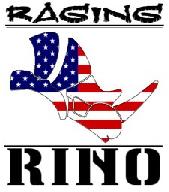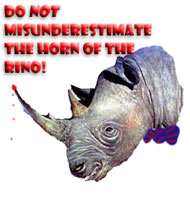October 01, 2004
9/11 and the Invasion of Mexico, I
Controversy is roiling in the Tasty Bits Comments section over my analysis of why we entered into WW2 against Nazi Germany and the connection (or lack thereof) to Pearl Harbor.
Here's what I wrote last night:
Kerry mentioned our attacking Iraq after 9/11 would have been like FDR attacking Mexico after Pearl Harbor.Now here's a question: what exactly did Nazi Germany have to do with Pearl Harbor?
Absofreakinglutely nothing.
If you go and read FDR's "Day of Infamy" speech, there is not one single reference to Nazi Germany or a role for America in the war in Europe. Not one.
Zippo.
Yet, within months, FDR decided to pursue a "Europe First" strategy which involved our putting the core of the United States Army into North Africa and then into Europe, on the other side of the planet from the perpetrators of the Pearl Harbor attack in Japan.
Why did he do this? Partly in response to the belief that Nazi Germany was developing a nuclear weapon.
Can you imagine what would have happened to Tom Dewey if he had tried to rip into FDR in the campaign of 1944 on this issue? He would have been crucified, and rightly so.
And of course, fifty nine years later we still have two US Army heavy divisions stationed in Germany.
First of all, the erudite and classically trained rhetoritician "BUSHIT" writes in "LEARN YUR HERSTORY BEFORE YOU VOMIT FOR THE CHIMPEROR!" Well, I punched it up a bit, but you get the drift. Another writer quite soberly asks if that in fact came later.
The web being what it is, here's a copy of Einstein's letter to FDR dated August 2, 1939. (Link goes to the Argonne National Laboratory operated by the Department of Energy and the University of Chicago) Unlike CBS's documents, these are copies of the real thing:
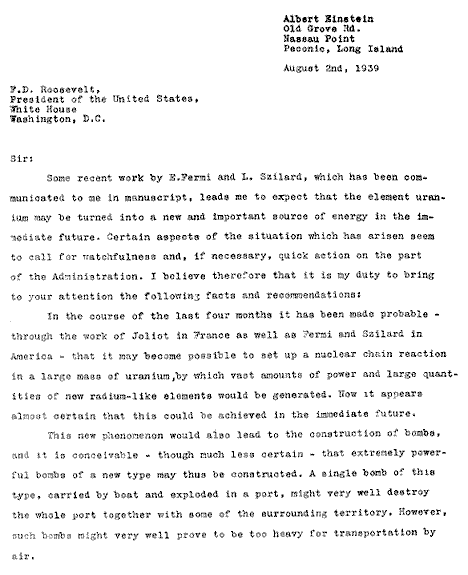
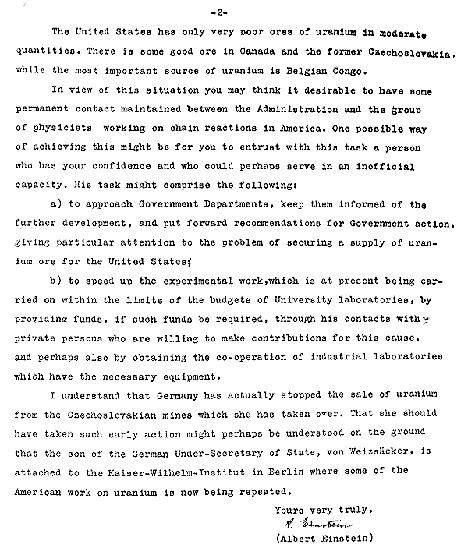
Was the perception and belief that the Nazis were building an atomic bomb the only motivating factor behind the Europe First strategy? Absolutely not. But it was an important factor among a large group of important factors. FDR recognized that the larger war was against fascism, and that meant attacking Germany and Italy as much as the Empire of Japan. Of course, we experienced quite a Blowback from our support of the Soviet Empire---the Cold War and their ultimate invasion of Afgahnistan, source of so many of our current woes.
The National D-Day Museum in New Orleans has a compelling exhibit on the strategic motivations that drove the Manhattan Project, juxtaposed with the planning for Operation Olympic, the invasion of the Japanese home islands. (I wrote about this on the old blog back in January).
As to the development of the "Europe First" strategy, the key set of meetings led up to the Arcadia Conference in Washington soon after Pearl Harbor. Military historian and retired Army General Charles F. Brower describes the plan succinctly:
First, there is the question as to just what was the agreed upon American strategy for the defeat of Germany. The Japanese attack on the American fleet at Pearl Harbor on 7 December 1941 and the subsequent declaration of war on the United States by Germany thrust the United States into a global and total war. At the hurriedly-called Arcadia Conference in Washington two weeks later, Roosevelt, Churchill, and their military chiefs of staff reaffirmed the strategic decision to defeat Germany first and agreed upon the general strategic concept for victory in Europe.The five-phased Arcadia Strategy involved the mobilization and build-up of Allied forces and resources; the maintenance and extension of Allied lines of communications; the erosion of Axis strength through a strategic air campaign; the isolation of Axis powers by "closing the ring" around Germany; and the eventual invasion of the European continent and the final destruction of Germany. This strategic framework largely describes the course of American military involvement in the European Theater of World War II.
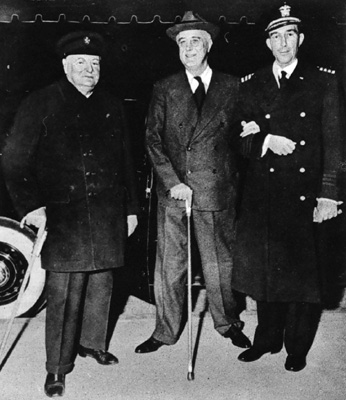 FDR and Churchill at the Arcadia Conference
FDR and Churchill at the Arcadia Conference
For an interesting and thorough analysis of the Arcadia Conference, this piece at the FDR Library has some prescient analogies for the situation today (particularly in light of Sully's one-note appropriation of all things Churchill)
Here's the key passage:
It is well known that cardinal strategic principle guiding Anglo-American war planners was to defeat Germany, the strongest Axis Power, first. But opinion polls in the United States showed that Americans were interested more in beating the Japanese than the Germans and Italians, an attitude clearly reflected on Capitol Hill. Winning a peripheral victory in North Africa, the Eastern Mediterranean or the Middle East might be good for the British Empire, but it was clearly not hastening the final victory in Europe and it was definitely delaying the comeback fight in the Pacific for which the American public was clamoring. It was only by a considerable intellectual effort that Americans had been persuaded that Germany not Japan was the most dangerous enemy, Secretary of War Stimson reminded Churchill. "The enemy whom the American people really hated, if they hated anyone, was Japan which had dealt them the foul blow." From the perspective of most Americans, therefore, the Mediterranean road was not the shortest way to victory, and Marshall and the Joint Chiefs believed it would be even slower that it ultimately proved to be. This specter of a long, plodding, costly war that would stretch out for years to come while testing the patience of the American people of a long tortuous approach that would stretch out for years haunted Marshall and the Chiefs and prompted their fierce arguments for an early cross-channel attack. "A democracy," Marshall told his biographer Forrest Pogue after the war, "cannot fight a Seven Years War."...
It seems to me that FDR's awareness of the need to devise a strategy that delivered incremental dividends to sustain the nation's investment of blood and treasure helps us to better understand his rationale for overruling Marshall and opting for the North African invasions in 1942.
FDR instinctively appreciated the imperative need to arrest the public's pull to the Pacific, for he believed that the defeat of Japan did not mean the defeat of Germany and that American concentration against Japan in 1942 or 1943 would increase the chance of a complete German domination of Europe and greatly complicate the final task of defeating Germany. On the other hand, he believed that holding Germany in 1942 or 1943 meant the probable, eventual defeat of Germany, and that Germany's defeat would mean the defeat of Japan in short order afterwards. "The necessities of the case call for action in 1942-not 1943," FDR told his military advisers. "I regard it as essential that active operations be conducted against Germany in 1942."
FDR also believed that continued prolonged inaction against Germany until 1943 as the Allies geared up for a cross-channel attack could create enough congressional and domestic pressure to force a shift of strategy toward the Pacific. To sustain support for the Germany First strategy, FDR worried about "finding a place where the soldiers thought they could fight" and concluded that only bloodying American soldiers in combat against the Germans would solve the problem.
Marshall later recalled that he learned an important lesson from the debate over TORCH: "The leader in a democracy has to keep the people entertained. (This may seem like the wrong word, but it conveys the thought.) The people demanded action. We couldn't wait to be completely ready. Churchill was always getting into sideshows and if we had gone as far as he did we would have never gotten out. But I could see that the president had to have something."
Others in the Joint Chiefs, casting an eye toward the November off-year elections, saw more crass political purposes motivating FDR's TORCH decision. Even the stilted bureaucratic style of the JCS minutes of the meeting following the president's decision fails to fully obscure their sentiments and resigned air: "There was an acceptance that apparently our political system would require major operations this year in Africa."
But Clausewitz reminds us that policy must be the guiding intelligence for war and that purely military considerations cannot be determinant in strategic calculations. Marshall may have been right that a 1943 invasion of Europe, made impossible by TORCH, might have shortened the war-though evidence is very strong that a 1943 attack would have been a badly premature and risky venture. Moreover, there remains the question of whether American strategists could have successfully resisted the powerful pull of the Pacific suction pump if major operations were delayed against Germany well into 1943.
As the Commander-in-Chief, FDR understood well that political considerations-especially the nature of his postwar relationship with Great Britain and the Soviet Union and the leadership role he envisioned for the United States in continuing that Grand Alliance into the postwar world and careful attention to considerations of national morale, the will and temper of the American people-must take priority over strictly military considerations. If he failed to arrest the public pressure to turn to the Pacific, if the United States left its European allies and turned to the Pacific, how could FDR hope to position the United States to lead in the postwar world?
These grand strategic political considerations weighed on the president's mind and guided his decisions. Partisan political benefits were to be viewed as a bonus, not as a principal objective. Recall that when military considerations led Eisenhower to set the date of the landings on 8 November, five days after the midterm elections, FDR remained mute. When Steve Early, FDR's press secretary, heard the announcement of the invasion five days after the Democrats had lost 44 seats in the House and 9 in the Senate, he exclaimed: "Jesus Christ! Why couldn't the Army have dome this before the election!" The Commander-in-Chief understood, however.
Nine months later in August 1944, after a successful Normandy invasion and breakout and the German army thought to have been mortally wounded, FDR could not resist crowing a bit to Marshall. "Just between ourselves (a phase we historians know cannot be realistic), if I had not considered the European and African fields of action in their broadest geographic sense, you and I know we would not be in North Africa today-in fact we would not landed in either Africa or Europe." Marshall did not respond. In fact, he never changed his mind about TORCH. But Eisenhower later acknowledged that it was probably the correct decision. The choice to go to North Africa rather than France in 1942 was "the great decision of the European war."
That it was, and one made by a grand strategist par excellence, Franklin Delano Roosevelt, Commander-in-Chief.
Read the whole thing, as they say: it is a learned and sophisticated analysis of strategic development in WW2. However, skip it if you enjoy reading Andrew Sullivan, because you'll see through the fraudulent partisan uses to which Sully uses the great man's ghost. The piece focuses in on FDR's decision to aim at Europe First, and how he reshaped public opinion away from immediate vengenance against Imperial Japan. It also details the controversy among the Chiefs of Staff over the decision to invade North Africa right before the congressional elections of 1942, an action General Marshall and other stridently opposed at first as a strategic distraction.
The point here is NOT to chastise FDR but to praise him: he saw the big picture, and realized that the proper course of action was not necessarily the popular or easy one. There is a sense that all Americans--with the exceptions of the nutbags in the German American Bund, and old hacks like old man Kennedy--were united in knowing what we needed to do and how to do it. Nothing could be further from the truth. The road seems linear because we know the decisions that were made and we know their ultimate success. But it is well to understand the context of the decisions and to understand their unpopularity. Europe First was not what FDR called for in the Day of Infamy speech, and was not popular at first among a public bent on getting even with Japan. Invading North Africa before the elections of 1942 was even more unpopular among the general staff, and was seen as a political distraction from the goal of landing in France.
But FDR was right on both counts, in the same way as that country hick who stood up to the war hero in the election of 1864.
My point in all this at first was to point out one mistake that was tossed off during the debate, but the reaction from "BUSHIT" and others points to a larger issue I'm going to explore in greater depth over the coming weeks.
Odd. Just finished reading "A Man Called Intrepid" and got the definite impression that "Germany First" was a commitment that Roosevelt made before Pearl Harbour. The basic reason being that if Britain wsa lost then there would be nowhere to plan or launch an invasion of Europe from.
The analysis ignores what our capacities were. We couldn't invaded Europe in 1942, even if we had wanted to. We didn't even control the Atlantic at that point, and the strategic bombing campaign over Germany and France hadn't even begun. Marshall favored a 1943 invasion (as did Stalin, obviously), but Churchill recounts the controversy in his volumes "The Grand Alliance" and "The Hinge of Fate." Churchill (and his General Staff) wanted to wait, for good reason, and they presuaded Roosevelt, who overruled Marshall. One reason the Brits wanted to wait is that they just didn't think the Americans were ready, that is, they lacked the necessary experience and know-how to fight the Germans (they were right).
In 1943, there was a raid on the French coast conducted by the Canadians: Dieppe. It was a catastrophe. And don't forget that American formations, in thier initial engagements against the Germans in N Africa, got trounced; they were salvaged and rescued by the more experienced Brits. Our inexperience, at all levels (including generalship), was telling, and the experience in Tunisia, Sicily, and Italy was most helpful in our preparations for D-Day. Also recall, that until June 1944, the Brits fielded more men against the Germans than we did; they carried the majority of the load; Churchill gloats about this in his history.
Also, it is not as if 1942 was some kind of washout in the Pacific. The year of 1942 saw the Guadalcanal campaign in the Solomons, the Doolittle Raid over Tokyo, and Midway. Midway was one of the decisive battles of WWII.
There were also 2 limiting factors in the Pacific. First, we just didn't have the Navy; at Midway we had 3 carriers, one of which (Yorktown) was in bad shape from the Battle of the Coral Sea. It took a while to build the ships (of all types) we required to move across the Pacific. Secondly, a large land army in the Pacific didn't fit the theatre; there simply was no place to utilize it (not to mention transporting it and supplying it in disparate locations all over the Pacific). This is one reason the Japanese could defend the Pacific and maintain a million-man army on the Chinese mainland at the same time. Small formations could defend/hold/attack Pacific Islands. Operation Olympic is an exception, but by that time we had the Navy, transport, and logistics to field a large field army, and we were presented with the invasion of large land mass, the Japanese homeland.
Posted by: MD at October 2, 2004 11:07 AMInteresting stuff. When Steve points it out, it seems obvious that FDR’s strategy to go against Germany with the bulk of the Army before Japan would be controversial. And the parallels to President Bush’s decision to go after Iraq despite its having nothing directly to do with 9-11 are obvious. But what he made me think about was the modern American Left’s use and conception of history, wars, and FDR.
To the Left, all decisions about war are weighed on a Viet Nam scale. How much is it like Viet Nam? How does it differ from Viet Nam? How does the lesson of Viet Nam (rarely if ever defined) apply to this question today? Will it take more or less time to become a quagmire like Viet Nam? And so on. It seems to them modern history begins with the assassination of JFK. World War II is ancient history, interesting but not really relevant. But after reading the Llama, the parallels between putting the war against Iraq before Iran or Saudi Arabia and the decision to put Europe before Japan (I’m speaking in terms of priorities here; obviously I know the European and Pacific theaters were pursued at the same time) is quite apt, germane, relevant, and important to discuss.
Why did FDR put the war against Nazi Germany and Italy (and the stinking Arabs who would switch sides at the last minute, but who remembers that or thinks of the Arabs as National Socialists, which just happens to mean the same as Ba’ath?) above the war against Imperial Japan? Weapons of mass destruction had something to do with it, much to my surprise. As early as 1939, Einstein wrote a letter to President Roosevelt warning him of the danger of Germany getting the bomb before America. Japan posed no such threat. There were many other factors, not least of which was England’s being on her knees.
The more we think about the War on Terror compared to history, the more it seems like World War II and the less like Viet Nam… unless you don’t think anything from before the 60’s is relevant. On this point, I think the Left is being more self-centered than ignorant.
But that’s war & peace. When it comes to economics, FDR is very relevant to them. He’s still the patron saint of American socialism and government-as-the-solution. There is no shortage of references to Roosevelt’s “great” economic planning and programs, and silent universal approval of his expanding the Supreme Court to get his programs past that pesky bottleneck of the Constitution. His alliance with the Soviet Union is hardly ever mentioned. No one seems to think about the fact that a war that began with the invasion of Poland ended with Poland occupied. IMHO WWII didn’t end until the Berlin Wall came down, but you’ll never hear FDR or Truman criticized for pulling America’s punch before Europe was liberated. Patton was right – Truman et. al. were wrong.
And now we have Democrat nominee Senator John Did-you-know-I-served-in-Viet-Nam Kerry talking vaguely about war and foreign policy, but always in terms of Viet Nam. And not only because that’s where he happened to have served.
I agree with your comments. Kerry's brain is in a 1970 time warp. Remember when, in the MSM, Afghanistan was going to be a "quagmire," no army had ever conquered it, the Soviets were run out with their tails between their legs, etc, etc?
The same thinking motivated the Somalia evacuation. Take a casualty, fight a battle, immediately it's a "quagmire," and panic sets in.
This has also led to the absurd "exit strategy" test. Just what "exit strategy" did the US have when it landed in Normandy? or Iwo Jima? or Inchon?
If your enemy knows you are looking for an "exit strategy," do you think they just might hold on while you tire of the job, and take actions that are more psychological than military calculated to sap the will and induce political panic?
Bush is absolutely the worst thing that could have happened to OBL, AQ, Saddam, and their ilk. They thought Clinton et al was representative of the US, that we would cut and run, talk and lot and do nothing, etc. Kerry will cut and run from Iraq ASAP, so he can "resume the war on terror," which for Kerry consists of meetings, summits, diplomacy, and photo ops.
Posted by: MD at October 2, 2004 06:15 PM
